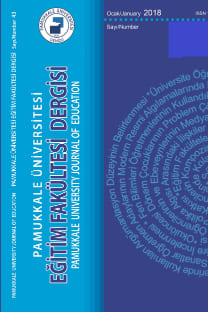İkinci Dilde Yazma Kaygısı: Algılanan Sebepleri ve Sonuçları
Second language writing anxiety, sources of writing anxiety
The Second Language Writing Anxiety: The Perceived Sources and Consequences
Second language writing anxiety sources of writing anxiety, consequences of writing anxiety,
___
- Atay, D., & Kurt, G. (2006). Prospective teachers and L2 writing anxiety. Asian EFL Journal, 8(4), 100-118.
- Ateş, S. (2013). Foreign language writing anxiety of prospective EFL teachers: How to reduce their anxiety levels (Unpublished master dissertation). Retrieved from Yüksek Öğretim Kurulu Ulusal Tez Merkezi. (370433).
- Cheng, Y., Horwitz, E. K., & Schallert, D. L. (1999). Language anxiety: Differentiating writing and speaking components. Language Learning, 49, 417– 446.
- Cheng, Y. S. (2002). Factors associated with foreign language writing anxiety. Foreign Language Annals, 35(6), 647-656.
- Cheng, Y. S. (2004). A measure of second language writing anxiety: Scale development and preliminary validation. Journal of Second Language Writing, 13(4), 313-335.
- Creswell, J. W. (2014). Educational research: Planning, conducting, and evaluating quantitative and qualitative research. Upper Saddle River, N.J: Pearson/Merrill Prentice Hall.
- Creswell, J. W., & Plano Clark, V. L. (2007). Designing and conducting mixed methods research. Thousand Oaks, California: SAGE Publications.
- Daly, J. A. (1978). Writing apprehension and writing competency. The Journal of Educational Research, 72(1), 10-14.
- Daly, J. A., & Wilson, D. A. (1983). Writing apprehension, self-esteem, and personality. Research in the Teaching of English, 17(4), 327-341.
- Faigley, L., Daly, J. A., & Witte, S. P. (1981). The role of writing apprehension in writing performance and competence. Journal of Educational Research, 75, 16–21.
- Golda, T. L. (2015). Exploring reasons for writing anxiety: A survey. The Journal for English Language and Literary Studies, 5 (2), 40-44. Retrieved from http://www.tjells.com/article/587_Golda%20Albert.pdf
- Hassan, B. A. (2001). The relationship of writing apprehension and self-esteem to the writing quality and quantity of EFL university students. Mansoura Faculty of Education Journal, 39, 1-36. Hyland, K. (2003). Second language writing. New York: Cambridge University Press.
- Kırmızı, Ö. & Kırmızı, G.D. (2015). An investigation of L2 learners’ writing self-efficacy, writing anxiety and its causes at higher education in Turkey. International Journal of Higher Education, 4(2), 57-66.
- Kim, J-H. (2000). Foreign language listening anxiety: A study of Korean students learning English (Unpublished doctoral dissertation). The University of Texas, Austin.
- Lee, S. Y. (2003). Teaching EFL writing in the university: Related issues, insights, and implications. Journal of National Taipei Teachers College, 16 (1), 111-136.
- Leki, I. (1999). Techniques for reducing second language writing anxiety. In D. J. Young (Ed.), Affect in foreign language learning: A practical guide to creating a low-anxiety classroom atmosphere (64-88). Boston: McGraw Hill.
- MacIntyre, P.D., & Gardner, R.C. (1989). Anxiety and second language learning: Toward a theoretical clarification. Language Learning, 39(2), 251-275.
- Miles, M.B., & Huberman, A.M. (1994). Qualitative data analysis (2nd ed.). USA: Sage Publications.
- Min, L. S., & Rahmat, N. (2014). English Language Writing Anxiety among Final Year Engineering Undergraduates in University Putra Malaysia. Advances in Language and Literary Studies, 5(4), 102-106.
- Phillips, E.M. (1992). The effects of language anxiety on student oral test performance and attitudes. The Modern Language Journal, 76, 14-26.
- Price, M. L. (1991). The subjective experience of foreign language anxiety: Interviews with highly anxious students. In E. K. Horwitz & D. J. Young (Eds.), Language anxiety: From theory and research to classroom implications (101-108). Englewood Cliffs, NJ: Prentice-Hall.
- Selfe, C. L. (1984). The predrafting processes of four high- and four low-apprehensive writers. Research in the Teaching of English, 18(1), 45-64.
- Sellers, V. D. (2000), Anxiety and reading comprehension in Spanish as a foreign language. Foreign Language Annals, 33, 512–520.
- Zhang, H. (2011). A study on ESL writing anxiety among Chinese English majors: Causes, effects and coping strategies for ESL writing anxiety (Master dissertation). Kristianstad University, Sweden.
- ISSN: 1301-0085
- Yayın Aralığı: Yılda 3 Sayı
- Başlangıç: 1996
- Yayıncı: -
Öğrenci Katılımına Zemin Hazırlayan Etkileşimsel Bir Kaynak: Eksik Tasarlanmış Sözceler
Nergiz KARDAŞ İŞLER, Ali Ekber ŞAHİN, Ufuk BALAMAN
Mizaç ve öz-düzenlemenin çocukların oyun davranışını yordamadaki rolü
Atiye ADAK ÖZDEMİR, Kadriye Selin Budak
Öğretmen Adaylarının Bilişim Suçları İle İlgili Tutum ve Bilgi Düzeylerinin İncelenmesi
Arzu DEVECİ TOPAL, Aynur KOLBURAN GEÇER, Osman AKKAYA, Yusuf Emre GÜZEL, Mustafa OF
Öğretmenlerin Proaktif Kişilik Özelliklerinin Problem Çözme Becerilerini Yordama Gücü
Hakan Şevki AYVACI, Gürhan BEBEK
Şenol ŞEN, Lütfiye VAROĞLU, Ayhan YILMAZ
Altıncı Sınıf Öğrencilerinin Gözünden Havacılık ve Uzay Mühendisi
Muhammed BALÇIN, Ayşegül Ergün
Buket ASLANDAĞ, Gökhan ÇETİNKAYA
Ortaokul Matematik Ders Kitaplarında Yer Verilen Matematik Tarihi İçeriklerinin İncelenmesi
